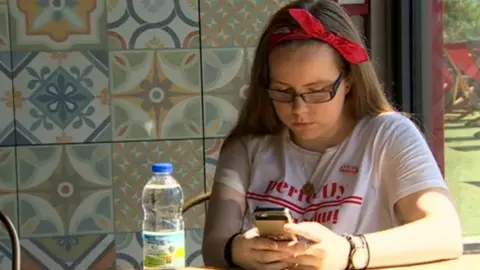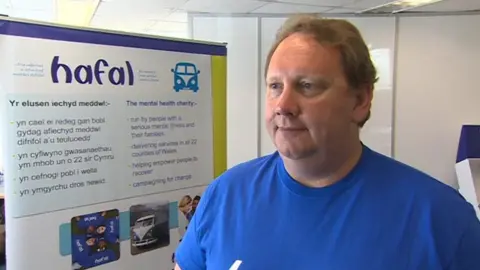Mental health: Wait for therapy added to teen's anxiety
When she was 15, Naomi Lea was suffering up to 10 panic attacks a day and self-harming.
Struggling with the pressure of social media and anxious about exams, she felt isolated and scared.
After calling ChildLine, she left a letter on her teacher's desk explaining her feelings, a school nurse referred her to Child and Adolescent Mental Health Services (CAMHS).
But it took another six months for her to be seen by a therapist.
When she finally got the therapy she needed, things improved, but she wishes things could have been different.
"Therapy really did make a difference. I built up the skills and tools that I needed to manage my anxiety and to then get through my exams and fulfil my potential," said Naomi, now 19, from Cardiff.
"There's just pressures coming from all angles."
Her long wait for help was likely compounded by "massive" pressure on mental health services for children and young people in Wales due to over-referral from schools, the mental health charity Hafal says.
About 1,800 children were referred to CAMHS last year, according to new health board figures obtained by BBC Wales - with the figure having fluctuated around this level since 2014.
The charity warned that some teachers were referring pupils unnecessarily - meaning those who need therapy most were often effectively barred from receiving it.
Naomi said she was "really lucky" to have seen good therapists who helped her work through her issues.
"But it was that wait where things got so much worse," she said.
"Without the delay, things might not have got so bad. There was just too much demand for the service they could offer."

She said some teenagers were struggling to cope in the age of social media.
"Young people are spending a lot of their time online and there's the pressures of seeing other people going out and feeling lonely about that and then also that pressure to portray yourself a certain way online, which is something I really struggled with," she said.
"I was seeing that everyone else was portraying these perfect lives and I didn't feel like I had that so you automatically make that comparison which then makes you feel worse.
"There's such an emphasis on your appearance and that links in with social media. People take thousands of selfies but just post one that they like online and there's just this pressure to portray yourself as this perfect person."

Alun Thomas, Hafal's chief executive, said teachers often do not have the time or expertise to refer and there needed to be a better way of assessing pupils who were struggling.
"The biggest challenge is for those children who really need CAMHS," he said, adding that some teachers were erring on the side of caution and referring pupils to mental health services when they might not need to.
"Unfortunately we have celeb culture where people are almost proud to have a banner of a mental illness," he said.
"So, we have young people who are undertaking exams and we use 'stress', we use 'anxiety', we use 'depression'.
"Actually, they should be a bit worried that they are undertaking exams because they have an impact on them, but it's normal.
"We shouldn't give it a diagnostic word, we shouldn't make it sound as if it's a medical problem… growing up is difficult enough without giving it a label."
Mr Thomas said he would like to see school nurses reintroduced to help pupils. The charity is also developing a scheme where GPs get to know children better before making a referral.
Specialist staff
Teachers' union NASUWT said students were now being exposed to a "melting pot" of pressures, with social media and academic competition having an impact.
It said it would be "fantastic" if extra resources were available, including funding for specially trained staff to take work "off teachers' shoulders" when potential mental health problems arise.
The Welsh Government said it was piloting three schemes under which experts give advice and support to schools.
One is in Wrexham and Denbighshire, one in Blaenau Gwent, Torfaen and Powys, and a third in Ceredigion.
A spokesman said: "The emotional and mental health of our young people is paramount. We are investing significantly in CAMHS provision, with £8m annual dedicated funding to improve access, recruit specialist staff and develop new services."
An NSPCC Wales spokesman said: "It is vitally important that children and young people can receive specialist treatment quickly when they are struggling with their mental health. Any delay can have a devastating and lasting effect on a child's wellbeing."
